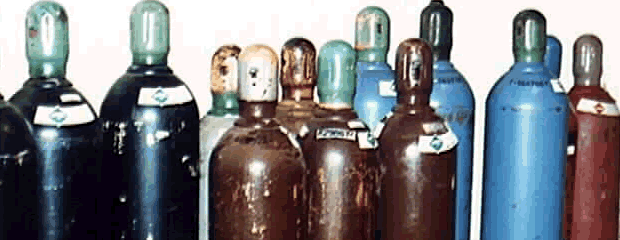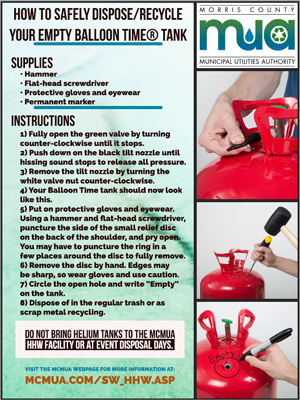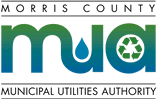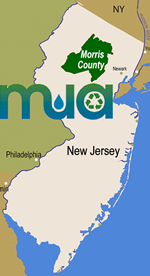Transfer Station Info (Tip Fee $113.00/ton)
- Mt. Olive Mon-Fri 7:30am-3pm; Sat 7:30am-11am
- Parsippany Mon-Fri 7am-3pm; Sat 7:30am-11am
- No Rental Trucks
- Payment by Account, Check, Credit Card. No Cash

Morris County
Municipal Utilties Authority
Join
3/6/26, 11AM MCMUA Bid Opening #2026-SW01 - 3 SELF CONTAINED COMPACTING UNITS
Join via Webex
or use the call in number: 408-418-9388 with Access code: 2348 996 4225.
Click to go to Notice/Bids Page

F.A.Q. Compressed Gas Cylinders
The MCMUA operates one of NJ's most comprehensive household hazardous waste (HHW) programs. This F.A.Q. page and information on hazardous materials is intended as a guide about HHW materials as well as the MCMUA's HHW program. This information is a general guide and does not constitute official rule, regulation or law.
Hazardous Waste Materials
- Adhesives
- Aerosols
- Antifreeze
- Appliances (CFCs)
- Art & Crafts
- Asbestos
- Batteries (Auto & Boat)
- Batteries, Household (dry cell)
- Cell Phones
- Compressed Gas Cylinders
- Driveway Sealer
- Electronics
- Fire Extinguishers
- Fluorescents
- Gasoline
- Medical Waste
- Kerosene
- Mercury
- Motor Oil & Filters
- Muriatic Acid (HCl)
- Paints & Stains
- Pesticides
- Photo Chemicals
- Pool Chemicals
- Propane
- Rock Salt
- Smoke Detectors
- Solvents
- Wood with Lead Paint

Returning Gas Cylinders to Supplier
As with most hazardous wastes, the best way to manage gas cylinders, canisters and cartridges is to avoid purchasing surplus amounts. This can best be accomplished by buying only what you need, by using all you buy, by emptying cylinders completely through routine use, and by not purchasing duplicate cylinders for those that are partially full in your inventory.
There are two types of cylinders-
 Cylinders supplied by industrial gas vendors (containing argon, carbon dioxide, helium, nitrogen, oxygen, air
and other common gases) usually in cylinders with screw-top valve covers.
Cylinders supplied by industrial gas vendors (containing argon, carbon dioxide, helium, nitrogen, oxygen, air
and other common gases) usually in cylinders with screw-top valve covers.
- Specialty gases, supplied by various vendors, commonly in lecture bottles (usually 12-15 inches long and 2 inches in diameter).
Group 1 usually are provided on a rental basis and have a deposit on them. These can be returned through central stores to the vendor. Group 2 are usually sold outright but may in most cases be returned to the vendor at a cost of $0-250. If the cylinder is disposed of through a chemical waste contractor it will typically cost $100-1000 for disposal.
If a specialty gas is desired that is not available through the vendor, the best solution is to rent the next larger size cylinder, rather than purchase a lecture bottle that may cost several hundred dollars to dispose later, even if empty. Although vendor's designations vary for the next larger size, these cylinders are generally about 20 inches long and 4 inches in diameter. Although these cylinders are provided on a rental basis, they almost always cost less than the same product delivered in a lecture bottle. The cylinders contain more product but may be returned even if they are not empty. Alternatively, you may be able to work with the vendor to purchase partially filled cylinders if you don't need full ones. This is the most economical and environmentally sound choice when using small quantities of gases. For more information contact your customer service representative.
For disposal, it is recommended the following steps be taken:
Contact the manufacturer or vendor of the gas cylinder in question to see if it can be returned. Even if a vendor is not on the list on reverse, they might accept cylinder returns. Check SKU# for seller information.
The following companies accept returns of propane gas cylinders (as of October 2023):
- ACV Environmental Services
- Home Depot
- Lowes
- Suburban Propane
- AmeriGas in Chester Borough
Follow instructions given by the vendor to ship the cylinder. They can provide the required shipping information. The following companies that may accept returns of non-propane gas cylinders (as of October 2023):
- Clean Harbors
856-467-3103 - Nouryon (formerly Texas Alkyls)
800-828-7929 - Must be a product purchased from them, can be shipped back for disposal. - Linde Welding Gas & Equipment Center - 973-366-5501
259 US Route 46 W, Dover, NJ 07801
Takes used gas cylinders to be recycled, free of charge - County Welding Supply Company
973-366-2320
69 E Dewey Ave, Wharton, NJ 07885
Takes welding tanks and gas tanks, no propane - Cylinder Recyclers
877-734-2925
https://www.cylinderrecyclers.com

